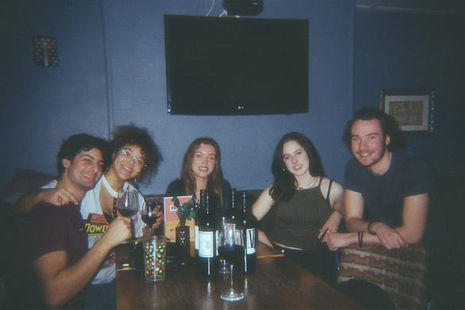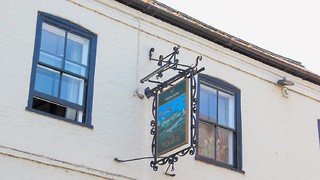The relationship between hospitality staff and Cambridge students
Amelia Makstutis investigates how hospitality can help bridge the town-gown divide

In a city that is often defined by its divide between town and gown, interactions between students and locals can feel few and far between. We inhabit beautiful, cloistered colleges, adorned not only with ornate stone carvings and pristinely manicured gardens, but also incongruous red signs reading “Closed to Visitors” furnishing the grand entrances, quietly underscoring the exclusionary nature of the University.
For many students, the only encounters with non-University members come in the form of transactions: like ordering a coffee before a lecture or a pint at the end of the day. These mundane, often-forgotten interactions reveal the subtle hierarchies of the city, but in doing so also give us the opportunity to move past them.
“The university is almost a city in and of itself,” according to Louis, a bartender at the Baron of Beef in Central Cambridge, “and it’s very clear when you aren’t a part of it”. The fact that students aren’t permitted to work during term times means that there is often little organic crossover between the two groups beyond the act of ordering and serving. Of course, this is not all-encompassing: Louis notes that “the social divide isn’t absolute”, having “gone out and drank, clubbed, and dated with people in the university”.
Louis notes that “the social divide isn’t absolute”, having “gone out and drank, clubbed, and dated with people in the university”.
Reh, who works in Clare College’s River Room Café feels regularly “appreciated” by students: “I feel like they are more like my friends [...] [because] most of them always make an effort to know about my day,” though sometimes when students have an exam, “they are in a rush to sit down and focus on their studies”. Aside from the occasional awkward interaction, like being told he looks ten years older than he actually is, Louis echoes this positive sentiment, even suggesting that students are “usually more polite than locals” since many of them work hospitality jobs themselves during holidays, which perhaps provides them with a sense of identification and acceptance “in their approach to hospitality workers”.
Student workers occupy a somewhat unique position; Ezekiel*, a student who works in Clare Cellars, finds that the job offers him a chance to get to know people he otherwise might not, like those from other year groups, but always on a personal, rather than purely professional level – “you’ve probably seen them in the library or around college”. This familiarity comes with its own challenges, though, as Ezekiel notes that before starting the job, he worried that people might not respect his authority, and in his experience, “sometimes a very small percentage of people will think it’s okay to be less polite because they know you’re also a student”. These moments are rare, though, and in general Ezekiel finds that people see his job as “a desirable position that people look up to”.
“sometimes a very small percentage of people will think it’s okay to be less polite because they know you’re also a student”
The phenomenon of student hospitality workers in Cambridge reveals a sort of middle ground between town and gown, if only for the duration of a shift. Ezekiel sees it as a “break from academic work”, a change to “use your brain in a slightly different way”, yet he notes that part of the “joy of having a student-run bar” is the “consciousness that you’re not a full-time worker there”. As a result, when students come in drunkenly after a pub crawl and proceed to order ten stone colds – Clare College’s infamously difficult to make green drink – he’s able to laugh through the process, knowing that he too relates to the frivolity of student life. “In all fairness, it’s kind of funny,” Ezekiel concedes.
Louis, too, notices humorous patterns in students’ behaviour, suggesting that “a student’s taste seems to be influenced more by price than by anything else”, and that he can tell that someone is a student by “how slowly they drink”. But perhaps more importantly, “students are usually a bit more accepting in their approach to hospitality workers”, and have a reduced risk of “being a Karen”, which Louis attributes to the generally younger age of students.
For Reh, “interacting with students and getting to know them” is one of the things she enjoys most about working in a student-oriented environment. A recent moment stood out to her as particularly nice, when a student told her she made “the best flat white”. “It made me so happy and I felt so appreciated,” she tells me.
In the context of otherwise limited social crossover between locals and students, it’s these interactions that carry all the weight, these gestures that aid us in breaking out of the mould of isolation that can sometimes be so central to Cambridge life. Compliments about coffee, chuckles about radioactive-looking cocktails – these are the moments that help erode the separateness of this city.
*Name changed by request
 News / Judge Business School advisor resigns over Epstein and Andrew links18 February 2026
News / Judge Business School advisor resigns over Epstein and Andrew links18 February 2026 News / Hundreds of Cambridge academics demand vote on fate of vet course20 February 2026
News / Hundreds of Cambridge academics demand vote on fate of vet course20 February 2026 News / Petition demands University reverse decision on vegan menu20 February 2026
News / Petition demands University reverse decision on vegan menu20 February 2026 News / CUCA members attend Reform rally in London20 February 2026
News / CUCA members attend Reform rally in London20 February 2026 News / Gov grants £36m to Cambridge supercomputer17 February 2026
News / Gov grants £36m to Cambridge supercomputer17 February 2026










